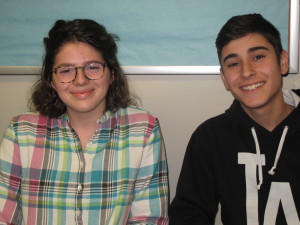By Susan Bromley
Staff Writer
Brandon Twp.- Matheus Dias and Carolina Pari are getting the experience of a lifetime this school year.
Matheus, 15, a native of Sao Paulo, Brazil, and Carolina, 17, who hails from Rimini, Italy, are classmates and exchange students studying at Brandon High School since August and while it is exciting and different, they agree it is in no way a vacation.
“It’s a growing up experience,” said Carolina. “It’s a sacrifice. I miss my family. You leave your life.”
Matheus agrees.
“Everyone here is in a rush,” said Matheus, adding that his hosts, the Martin-Granlund family, has three kids and there are soccer games and swim classes and cheer practice and seemingly no time to breathe. “I’m like, ‘What is happening? I’m lost.’”
Both Matheus and Carolina, who is staying with the Violassi family, like their hosts very much and are grateful, even as they miss their own parents and siblings.
Carolina’s parents are restaurant owners and she has a twin brother. She lives with her family in a home close to the beach— just five minutes from the Adriatic Sea. Matheus has a 4-year-old sister and his mother owns a hair salon, while his father is a surgeon. He hopes to follow in his father’s footsteps and study medicine in college, in America. While he will return to Brazil in June it will be temporary. In August, he, his mother, and his sister will move to Florida. His father will join the family in December.
The immigration issues that have arisen since Donald Trump assumed the presidency have not had an effect on his family, although he said where he comes from the new U.S. president is not looked upon favorably.
“People in South America don’t like Trump too much, but it doesn’t seem to affect us immigration wise, I don’t know why,” said Matheus, who adds that Brazil has political problems as well, including corruption. Last year, their president, Dilma Rousseff, was impeached and removed from office. “My parents want to come here because they think it’s a better future for me and my sister. There is a lot of pollution in Brazil and they want a change.”
Carolina said the U.S. election was seen as crazy and the U.S. is now viewed as split, a concern for “the whole world.”
Politics aside, she will be both excited and sad to go back home to Italy.
“I’ve built a life here I’m not going to live again.”
“Everybody is like, ‘You’re doing whatever you want. Um, no.”
The pair share many views about their experience, even as they each come from different continents. Both say school is more difficult in their home countries.
In Italy, where high school is five years instead of four, students retain the same teacher and classes for those years.
“We stay in the same room and the teachers come to us,” she noted. “There isn’t 1,200 students moving at the same time.”
There are no electives offered, instead, Italian students go deep into the subjects taught. Carolina explains that she dislikes math and chemistry, but it doesn’t matter. She can’t drop the classes and take something else, even if she is failing.
Brazil is similar, with no electives. The 13 different subjects Matheus and his Brazilian classmates study include biology, chemistry, physics, math, art, history, literature, writing, physical education, grammar, Portuguese, Spanish, and English.
Different subjects are taught different days and the schedule varies. Three days a week, he attends from 7:10 a.m.-12:30 p.m. The other two days are 7:10 a.m.-12:30 p.m., with a 50-minute break for lunch followed by another four hours of school from 1:20-5:30 p.m.
Carolina attends school six days a week from 8 a.m.-1 p.m., including Saturdays.
“We really care about meals together, so we have to go home,” she explains.
Meals are such a focus in Italy, in fact, that she said most of the workforce takes a break from noon-3 p.m. Shops reopen at 3 p.m., and then shut down for the night at 7:30 or 8 so families can have dinner together.
Food is the biggest difference she has noticed between Italy and the U.S. Besides Italians basing their schedule on making it home for lunch and dinner, they also tend to eat healthier food, made from scratch.
“My grandma makes noodles, there is no way we’re buying that in the store,” Carolina said. “There is frozen food, but no one buys it, it sucks. Frozen pizza sucks.”
Matheus interjects, “No it doesn’t!” But he agrees that mealtime in Brazil is much more laid-back and people lingering over meals for conversation. That relaxed atmosphere in Brazil and a much more harried pace in America is what he cites as the biggest difference.
